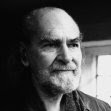
If you don't have this magnificent book, buy it. For £12, you get Basil Bunting's masterpiece, Briggflatts, a collection of short readable pieces about Bunting's colourful life and the poem, a DVD of a film made for Channel 4 in 1982 about Bunting (which simply wouldn't be made by that channel these days, proof positive of dumbing down big style) and a CD of the poet reading the poem in his gruff Northumberland accent (the 'r's are rolled at the top of the throat).
Annoyed by critical speculation about the 'meaning' of the poem, Bunting composed an entertaining note to set the record straight. Like the poetry, it is simultaneously authoritative and slyly elusive. he explains the scheme of the poem and then asserts: All old wives' chatter, cottage wisdom. No poem is profound
Given Bunting's irritation at the thought of critical dissection, I hesitate to put forward my thoughts about the poem except as a brief record of my experience of reading it to date, assisted by the film and Bunting's own reading.
For me, the poem reflects a sense of mortal transience set against the flinty longevity of Northumbrian English, the often harsh but sometimes lovely landscape of the far North of England and the power and wildness of the sea. It also encapsulates criticial moments from Bunting's own life in Northumberland, London, Italy and the Middle East. You will also find nuggets of history there, most memorably, the story of Eric Bloodaxe. Underlying this rich compost is a 50 year old love affair which the narrator in the poem (presumbaly Bunting) failed to pursue. It is therefore also a poem of regret and acceptance.
Somehow the poet manages to recreate in modern English, the sense of Old English (i.e. Anglo-Saxon and perhaps Norse) verse. Some of it is reminscent of the poem, so wonderfully translated by Bunting's friend, Ezra Pound, The Seafarer and of course Anglo-Saxon verse in particular was concerned with crisis, transience, loss and failure. But it's the sound of the lines which revive the dynamics of Old English verse, like these:
Furthest, fairest things, stars, free of our humbug,
each his own, the longer known the more alone,
wrapt in emphatic fire roaring out to a black flue.
However, the fluidity of the subject matter gives the poem a Modernist (and Post Modernist)feel.
Annoyed by critical speculation about the 'meaning' of the poem, Bunting composed an entertaining note to set the record straight. Like the poetry, it is simultaneously authoritative and slyly elusive. he explains the scheme of the poem and then asserts: All old wives' chatter, cottage wisdom. No poem is profound
Given Bunting's irritation at the thought of critical dissection, I hesitate to put forward my thoughts about the poem except as a brief record of my experience of reading it to date, assisted by the film and Bunting's own reading.
For me, the poem reflects a sense of mortal transience set against the flinty longevity of Northumbrian English, the often harsh but sometimes lovely landscape of the far North of England and the power and wildness of the sea. It also encapsulates criticial moments from Bunting's own life in Northumberland, London, Italy and the Middle East. You will also find nuggets of history there, most memorably, the story of Eric Bloodaxe. Underlying this rich compost is a 50 year old love affair which the narrator in the poem (presumbaly Bunting) failed to pursue. It is therefore also a poem of regret and acceptance.
Somehow the poet manages to recreate in modern English, the sense of Old English (i.e. Anglo-Saxon and perhaps Norse) verse. Some of it is reminscent of the poem, so wonderfully translated by Bunting's friend, Ezra Pound, The Seafarer and of course Anglo-Saxon verse in particular was concerned with crisis, transience, loss and failure. But it's the sound of the lines which revive the dynamics of Old English verse, like these:
Furthest, fairest things, stars, free of our humbug,
each his own, the longer known the more alone,
wrapt in emphatic fire roaring out to a black flue.
However, the fluidity of the subject matter gives the poem a Modernist (and Post Modernist)feel.
No comments:
Post a Comment